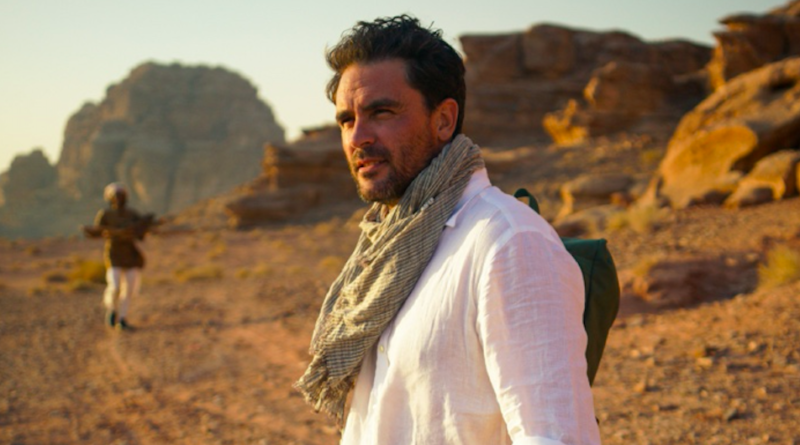INTERVIEW: Levison Wood documents Middle East cultures and communities on new KCET series
Photo: Arabia is a new five-part miniseries starring Levison Wood. Photo courtesy of KCET / Provided by press rep with permission.
Arabia With Levison Wood is a new travelogue series that finds the host journeying throughout the countries and cultures of the Middle East. What he finds is fascinating: rich history, unique cultures, people of numerous faiths and breathtaking natural wonders. He also doesn’t sidestep the difficulties and struggles of the war-torn region throughout the five episodes of the series.
Arabia is set to premiere Tuesday, Nov. 10 at 8 p.m. PT on KCET in Southern California. The first episode is titled “Battlegrounds” and looks at the Arabian Peninsula, including the area along the border of Syria and Iraq that has been ravaged by ISIS. Future episodes focus on Oman, the largest sand desert in the world, Saudia Arabia, Jordan, the Petra archaeological site and Israel, among other areas.
“So I first traveled to the Middle East back in the summer of 2003,” Wood said in a recent phone interview. “I was a young student backpacker, and I was traveling around Egypt and Israel. Of course, that was the year of the Iraq War, and due to a number of incidents that happened when I was traveling around Egypt, there was a spate of suicide bombings that occured in the region, which meant that various borders got closed. So I wasn’t actually able to make my way home. Myself and my friend we ended up having to hitchhike all the way through Iraq, through Baghdad, when the war was happening.”
Wood remembers this early experience and being terrified of getting stuck for a couple weeks in Iraq. He was 21 years old at the time, and although he had a real insight, fascination and love for the region, he recognized that the war around him was dangerous.
“Over the following 15 years or so I’ve been able to revisit the region in various guises as a photographer, as a reporter,” he said. “I was embedded with the Kurdish troops in Iraq and Syria, so I’ve seen how it’s changed or perhaps not changed over the last 15 years. I saw this as an opportunity to go and I guess show the state of affairs now, but rather than just focusing on the negatives, on the stereotypes, on the devastation and conflicts, really without ignoring all that, really shine a light on the humanity of the region as well and show what the ground truth is like for the people that live there. And it’s not all doom and gloom.”
When Wood tried to synthesize the vast and diverse Middle East into a five-episode miniseries, he chose a route that had meaning and reason. For this TV projects, he usually starts with a geographical feature, and then his camera operator simply hits record. He has done this throughout his illustrious career, whether walking the River Nile or hiking in the Himalayas.
“I don’t set anything up,” Wood said. “It’s very much expedition focused, and what happens happens. So I chose to circumnavigate the whole Arabian Peninsula, starting on the Turkish border in norther Iraq and Syria, and follow it all the way around the edge to get all the way to Lebanon. In doing so, I encountered different groups and different communities, and what I try to do is tell their story.”
Wood’s traveling took him through the region from September 2017 to March 2018, six months that aligned with the closing battles against ISIS. The TV host reported a lot of turbulence in the area, with many political changes and difficult border crossings.
“It was definitely a challenge to overcome, something that still hasn’t really gone away in its entirety yet,” Wood said. “It’s not like all the people that were in ISIS have disappeared or died. They’re still there. Maybe they put their weapons down for now, but ISIS themselves was simply, in many cases, a reiteration of al-Qaeda, a reiteration of the disbanded armies of Saddam Hussein. So actually the names changed, but actually the situation over the last 15 years has actually stayed as volatile as ever. It was tricky getting access, getting across borders, very, very difficult particularly in places like Yemen and also through Syria as well. To go through western Syria, we had to go under the armed guard of the Russians, for example. … It’s a tricky balance because I’ve now seen it from all the different sides really, and it’s a very, very complicated story to tell.”
When Wood traveled for the Arabia series, he made sure he could move around quickly. That meant hiring one camera operator and one local guide — that’s it. Sometimes he needed to change the camera operator, depending on the country he was in.
“Getting visas can be tricky, and for a lot freelance cameramen, as you can imagine, they’re not always welcome in every country that I go through,” he said. “Then the guides, the locals who are fixers and translators, for this particular journey, that was especially difficult. … I have to change guides quite frequently along the way. My rule of thumb is if it doesn’t go in a small backpack then it doesn’t go. We travel light — small cameras, nothing too intrusive. We don’t go with a whole circus of sound guys and all the rest of it. Often it’s just too dangerous. You’ve got to be able to blend in and all fit in one vehicle, so you can get out of there if need be.”
Now audience members have the chance to see what Wood found on his travels throughout an endlessly interesting region of the world.
By John Soltes / Publisher / John@HollywoodSoapbox.com
Arabia With Levison Wood premieres Tuesday, Nov. 10 at 8 p.m. PT on KCET in Southern California. Click here for more information.

